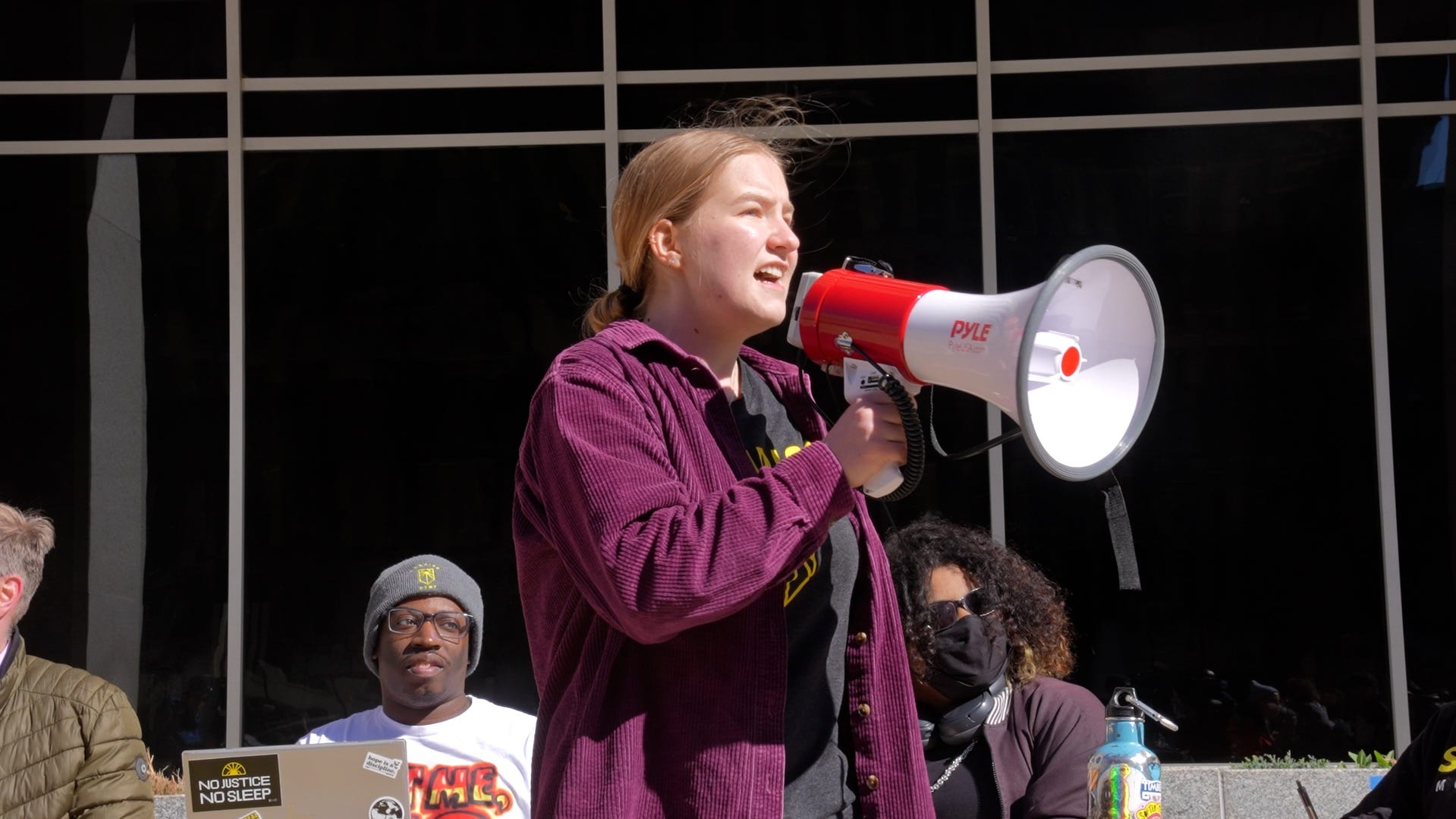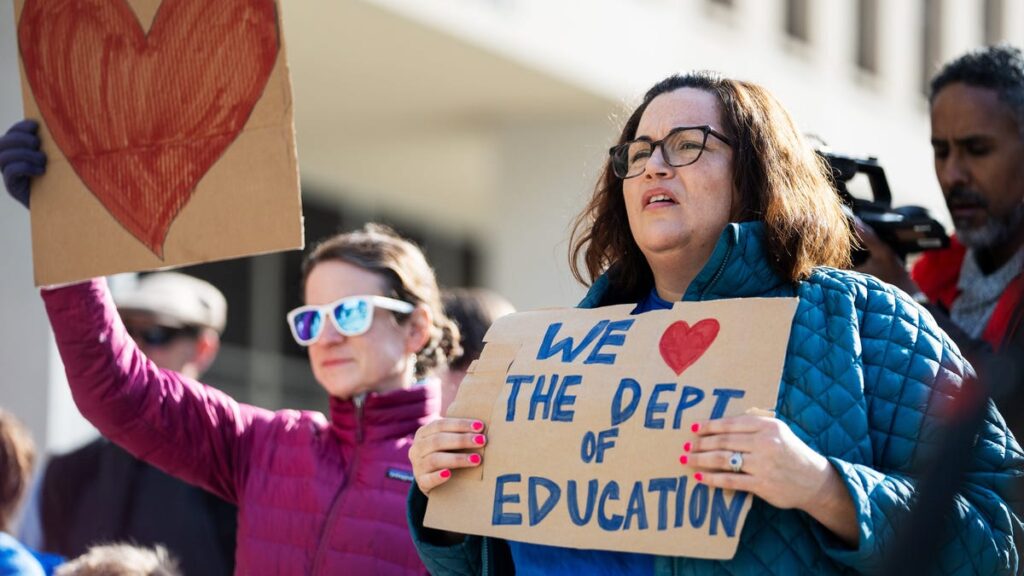
Protesters stage ‘study-in’ in front of Education Department
Protesters staged a “study-in” demonstration in front of the Education Department after President Donald Trump’s executive order.
Amy Cupp was alarmed when her sixth-grade daughter came home from school with bruises in the shape of fingerprints.
School staff had locked the girl in a room while trying to restrain her in November 2024, said Cupp, a social worker in rural Indiana. Her daughter has multiple severe disabilities, including autism and auditory processing disorder, that cause her to have tantrums and occasional bouts of physical aggression.
Cupp was already concerned that staff had restrained or secluded her daughter 29 times for a total of more than 23 hours in just the few months since the school year began, compared to 10 times when she was in elementary school.
Cupp complained to school officials and they agreed to implement new procedures for preventing and managing her daughter’s outbursts that would reduce the use of restraint and seclusion.
But they failed to implement those changes to her liking, she said.
So Cupp contacted the U.S. Department of Education’s Office for Civil Rights in December 2024.
On Dec. 16, a staffer from the department’s Chicago office called Cupp to learn more about her daughter’s case. A month later on Jan. 14 – days before President Donald Trump’s inauguration – they sent her an email saying the case was progressing.
The news ignited hope, but it was short-lived.
The department’s regional civil rights office that was handling her case then closed as part of President Donald Trump’s effort to dismantle the agency.
“They were shut down,” Cupp said. “Shortly after we talked, I got notice that the Chicago office was being shut down – and all employees let go. So now we are here waiting, all while my daughter and her peers are being abused and put through trauma.”
Cupp is among several families now suing the federal Education Department, Education Secretary Linda McMahon and Acting Assistant Secretary for Civil Rights Craig Trainor for what they call an “attack” on the department’s Office for Civil Rights and its ability to process complaints and investigations.
They say the Trump administration is causing “significant harm” to students by temporarily halting civil rights cases, gutting the office’s ability to investigate cases by reducing staff, and attempting to eliminate the Education Department. They also fault the administration for allegedly prioritizing what they call “targeted investigations into purported discrimination against white and cisgender students.”
Norwell Community Schools, her daughter’s school district, denies the allegations in Cupp’s federal civil rights complaint, said Nicholas Hursh, an attorney for Norwell Community Schools, in an email to USA TODAY.
District staff and its administration supported the Cupp family and provided extensive case meetings with them, Hursh said. The district also reasonably responded to Cupp’s allegations before and after several investigations into the incident, including by the Indiana Department of Education, local police and Indiana’s Department of Child Protective Services, he added.
The National Center for Youth Law, a national nonprofit advocating for marginalized youth and children, and the Council of Parent Attorneys and Advocates, a nonprofit organization that supports families of students with disabilities, filed the lawsuit on behalf of the families who have open complaints of civil rights violations against their schools. The families argue they’ve been left in the dark without information about when or whether there will be movement toward a resolution in their cases. They say the department is “causing significant harm” to students with disabilities, students of color, women and girls and LGBTQ+ students.
“The gutting of OCR’s staff means that no complainant has a fair shot at accessing an OCR investigation,” the lawsuit reads. “OCR has abdicated its responsibility to enforce civil rights protections, leaving students who should be able to trust and rely on their government to protect and defend their rights to instead endure discriminatory and unsafe learning environments without recourse.”
The lawsuit comes after the Trump administration temporarily halted the Education Department from investigating civil rights discrimination cases altogether. The administration resumed its work on disability-related civil rights discrimination cases on Feb. 20, and later resumed all cases on March 6, said Julie Hartman, a spokesperson for the federal Education Department.
Then on March 11, the department laid off nearly half of the staff at its civil rights enforcement offices. The administration also closed several of its local civil rights offices to slash government spending and “dismantle bureaucracy.” Trump has said his long-term goal is to shutter the department altogether.
Selene Almazan, a legal director Council of Parent Attorneys and Advocates, said the lawsuit is seeking “an order that would compel” the Trump administration” to restore the Office of Civil Rights’ capacity to process complaints promptly.
A majority of the nation’s civil rights discriminations complaints over the past several years involve students with disabilities, according to a 2024 report from the office. But since Trump took office, the Education Department’s Office for Civil Rights has announced several investigations into civil rights cases that have claims of transgender student participation in sports and alleged antisemitism related to student protests over the Israel-Hamas war.
Madison Biedermann, a spokesperson for the Education Department, said no civil rights discrimination cases have been paused since Feb. 20 but cases “have been transferred” within the civil rights office.
“I understand that it might be a shift to a new point of contact for family, and that may be frustrating and concerning,” Biedermann said.
Biedermann declined to comment on the lawsuit, but she said it is not uncommon for operations to pause and changes to occur during presidential transitions.
“The ultimate goal is to dismantle the Education Department,” Biedermann said. “That’s no secret.”
Trump administration may move civil rights discrimination cases to Justice Department
Trump, who signed an executive order attempting to shutter the Education Department, has said that other agencies could take over the current roles of the federal education agency.
In March, McMahon said the Department of Justice could take over the work of the Education Department’s civil rights agency.
“Clearly, their Office of (sic) Civil Rights (is) very geared up, very ready to take on that kind of responsibility,” McMahon said, referring to DOJ.
The Education Department recently announced that cases categorized under Title IX, a federal law that prohibits discrimination based on sex in federally funded schools, will be handled by a team of investigators from the Education and Justice departments.
McMahon has said that schools, colleges and universities that are under investigation by the Office for Civil Rights should not take the administration’s attempt to dismantle the federal education agency as a “free pass.”
“Understand that we have an attorney general that means business,” McMahon said.
Hartman, the spokesperson from the Education Department, said the department’s Office for Civil Rights is now “working vigorously to protect all Americans – and especially our most vulnerable – from unlawful discrimination”
“OCR is evaluating hundreds of disability discrimination cases that have been reported since just January 20, as well as addressing the backlog left by the previous administration,” she said. “This includes launching a major investigation into D.C. Public Schools for their failure to protect to protect the rights of students with disabilities.”
How does the Education Department’s Office for Civil Rights help students?
The Education Department’s Office for Civil Rights has for decades safeguarded students from discrimination in part by investigating possible violations of five civil rights laws, including Title VI of the Civil Rights Act of 1964, which bans discrimination in programs and activities that receive federal dollars.
Families, teachers and community members typically file a case with the Education Department’s Office for Civil Rights when they suspect a school district, college or university violated students’ civil rights.
Staffers at the Office for Civil Rights then gather information and investigate whether the school or district violated any civil rights laws. If they find the school did violate students’ civil rights, they can move to mediate the situation with a resolution between the federal office and the school. Resolutions between that office and school districts, colleges or universities often include staff training, changes to school policies and monitoring from the federal office.
A backlog of cases has long existed at the civil rights enforcement agency.
The Office for Civil Rights received 22,687 complaints, the highest number of discrimination complaints ever in the fiscal year of 2024, according to a report by the federal office.
The lawsuit is “seismic” and the fate of the Office for Civil Rights could have lasting impacts on the future of civil rights across the nation, said Jonathan Collins, a political science professor at Teachers College, Columbia University.
“This has been the primary institution for monitoring and protecting essential protections in the Constitution guaranteed to kids and families,” Collins said, about the office.
He worries if cases are moved to the already-burdened Department of Justice, they will be buried.
‘It is happening elsewhere’
Cupp is also concerned for others who face discrimination in their schools while waiting for a resolution from the Office for Civil Rights.
“I know if this is happening in our small community in a conservative Indiana community, it is happening elsewhere,” Cupp said.
The other families’ cases in the lawsuit include allegations of schools not doing enough to prevent different types of discrimination ranging from sexual assault to racial discrimination.
A mother in one of the cases filed a complaint with the Education Department’s Office for Civil Rights in May 2023 after her child’s school district in Michigan “failed to adequately and timely respond to and investigate her report of sexual assault and harassment of her thirteen-year-old daughter,” reads the court document from the lawsuit same lawsuit Cupp joined. The parent reported to the school district that her child was being sexually assaulted by a classmate in a bathroom at a high school in the district.
Her daughter did not want to return to school following the events and experienced a decline in her mental health that eventually led her to self-harm, the lawsuit reads. The mother had to move her daughter to a different school at first and eventually “withdrew her daughter from school altogether during her freshman year due to her daughter’s mental health treatment and hospitalizations.”
She said in the lawsuit that the Office of Civil Rights opened an investigation into the case in May 2023. But the closure of the Office of Civil Rights’ Cleveland regional office led to a transfer and freeze of her case, she said. On March 17, she was notified that her case had been transferred to the Denver office and she has not heard any updates on her case since, according to court documents.
“As a result, she and her daughter are left without resolution of their claims, accountability for the school district, or the opportunity to return to their home school with improved policies and protections in place,” the lawsuit reads.
Almazan, the legal director from the Council of Parent Attorneys and Advocates, said students are at risk of harm and further discrimination and susceptible to missing academic lessons or losing interest in school in the meantime.
“Some families just felt like the world had been ripped out from underneath them because they were counting on the OCR for some accountability for discrimination,” she said.
Cupp’s daughter is part of that group.
“She doesn’t like to go to school,” Cupp said. “And she always loved school.”
Cupp would like to send her daughter back to school full-time if she felt conditions were safe, but for now, she feels like she’s in a “waiting game.”
“I joined this lawsuit because I have nowhere else to turn right now,” she said. “Restraint and seclusion are so detrimental for students. School is supposed to be a place where they should be safe.”
Contact Kayla Jimenez at kjimenez@usatoday.com. Follow her on X at @kaylajjimenez.



